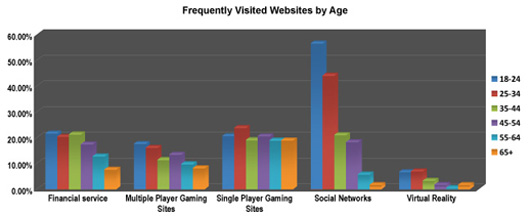Hi Folks, here an interesting piece of data from SSI. Looks like the Boomers are at it again showing up in larger numbers even on Facebook. This is very good news for advertisers since the Boomers have the money or at least used to. More importantly for the entertainment industry is their adoption pattern mimics their film going patterns which means that reviews including peer reviews will matter again bigtime. Perhaps that is why indie films like Milk and The Wrestler are doing so well, they are after all adult entertainment. Dr. Media says watch this space, as Boomers have done their whole lives they will change the face of the web, with their demands for services, travel, health, retirement, finance, community awareness, education and all will benefit.Read my earlier post on the audience data for Hulu, it supports this info,this will be an interesting opportunity for the right marketing efforts,and of course,we can help with that can't we?
SSI Research | SSI - Survey Sampling International

SSI Research | SSI - Survey Sampling International
SSI Research Reveals Baby Boomers Tech Savvy
One in 4 visits social network sites
A recent survey conducted by SSI found that baby boomers - Americans born between 1946 and 1964 - tend to catch on quickly to the technology at hand. While they may not be the first to jump on the bandwagon, when they do, they do so in numbers. Around 35% of respondents ages 45-54 say they are among the first to adopt a new technology compared with 40% of respondents ages 18-24 who make this claim. Baby boomers also have a solid, and growing, online presence on social networking Web sites. While they are not taking over sites such as MySpace, Facebook, and LinkedIn, they are definitely leaving their mark. One in four baby boomers reports visiting a social network page often.
Survey respondents who say they are among the first to adopt a new technology.
Survey respondents who visit certain types of Web sites always or very often.
More than 30% of baby boomers visit multi-player gaming Web sites. This might be attributed to the focus some gaming sites are putting on the baby boomer crowd by offering games designed to keep the mind sharp.
SSI's findings, which challenge pre-conceived ideas about the interests and habits of certain demographics, are welcome news for researchers. Technology-related studies need not be limited to youth. Baby boomers, currently 20.5% of the US population, can provide informed, thoughtful responses, too.
What's more, baby boomers tend to have an attractive disposable income level and are doing their best to remain youthful. This may explain the shrinking generation gap between baby boomers and their children, and their quick adaptation to activities that would otherwise be considered "for kids."
SSI regularly conducts research on our panels in order to gain an in-depth understanding of the lifestyles and experiences, beyond demographics, of respondents. SSI's Knowledge Management Team is dedicated to assessing, producing, and conveying information to researchers through research-on-research, industry conferences, joint projects, and knowledge sharing.



